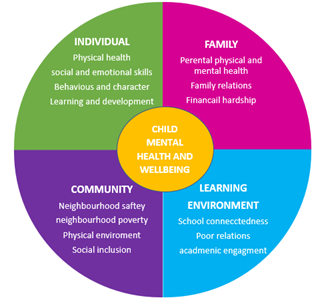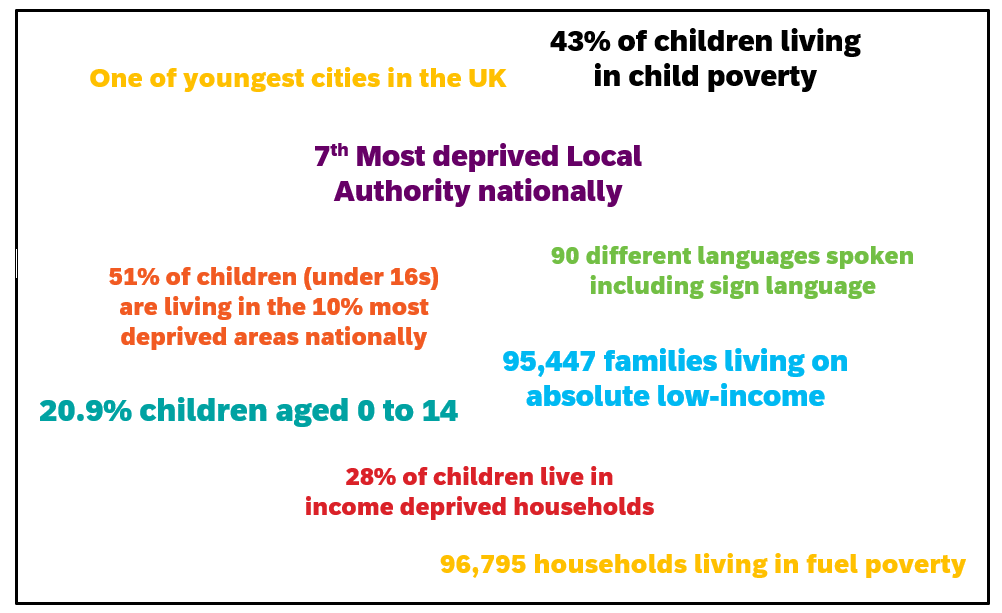
Utilising data to gain insights into the environments of young people beyond the school setting workshop
The Learning to Shape Birmingham Conference is held annually with the mission of bringing our community of Birmingham schools together to build strong, supportive and mutually beneficial local and city-wide partnerships, ensuring that no school is left isolated.
This year our new Insight, Policy, and Strategy division had an opportunity to run a workshop at the conference and provide insights into the environment of young people in Birmingham beyond the school setting.
The environment is an important factor in child development. Family, community, neighbourhood, religion/ethnicity and school all being factors in influencing and affecting child development. These can also impact on a child’s overall growth and outcomes. For example;

- Socioeconomic status, parental conflict and trauma can affect a child, their mental health and wellbeing, character, behaviour and outcomes.
- Financial conditions of a family can affect various aspects of a child and their childhood experiences.
- The quality of housing and the physical environment a child is living in can affect their health, exposing them to a wide variety of external conditions.
- The neighbourhood and community a child grows up in and the things they see around them can influence their early learning.
Using a range of datasets (beyond those that report school outcomes) we provided an interactive and engaging workshop delivering key insights and an overview of Birmingham and the environment in which young people are living. Thus, allowing individuals to access new understandings of the communities we serve.
We started off with an interactive quiz, providing insights to the Birmingham and young people – it’s population, ethnicity, deprivation, health and wellbeing, employment, and poverty.

The winners (of those who participated and represented their school/college) were;
1st Ark St Alban's Academy
2nd Hodge Hill College
3rd Cromwell Primary
Key insights that shocked individuals were the levels of deprivation and poverty.
Deprivation: 88% of Birmingham’s wards are more deprived than the England average

Poverty: Birmingham’s child poverty rate modelled at 43% for 2019/20, which is over 100,000 children.
In addition to 95,447 families in Birmingham living on absolute low-income prior to the cost of living crisis. These being households living with income below 60% of (inflation-adjusted) median and therefore resulting in being unable to meet their basic needs (i.e. food and shelter).
Following understanding of the city insights we focused our group exercise on our Birmingham modelled school ‘Birmingham School for All’ which used the median for all datasets in relation to the area, households, individual and attainment/outcomes. Most of which were broken down at Ward level.

Acknowledging every school is unique and different, and all face individual challenges, the school provided a median position for some engaging and active group discussions.
We discussed:
- how the environment impacts outcomes for children:
- The more deprived children are the more they lack personal social skills and are below the expected level.
-
- Young people’s progression pathways systematically differ based on their background characteristics, such as gender, ethnicity, special educational needs, prior attainment, eligibility for free school meals (FSM) and region.
- what we are/can be doing to better support young people and their families in localities with school:
- Working with families/parents/carer:
- Bring families into the classroom for smaller events – encouraging students and their families to attend workshops and take part in hands-on learning experiences.
- Undertaking group talks with parents/caregivers and teachers to understand how children are taught and how they can help.
- Working with families/parents/carer:
-
- Creating community spaces to help students and families address challenges they might be facing outside of the classroom. An approach taken by Vancouver Public School.
-
- Use of facilities to provide events supporting parent/carers such as jobs fairs, adult education courses/workshops.
- who can we further collaborate with:
- CHAMS
- Health Care Professionals
- Youth Offending Team
- Birmingham Adult Education Service
- Community / Faith Leaders
- Voluntary / not for profit organisations
Overall, the workshop was an engaging and though-provoking session with very positive feedback from those who attended.
By Jagdeep Matharu
Insight, Strategy and Policy Lead
References:
- Children’s Health, The Nation’s Wealth: Assessing and Improving Child Health, National Research Council and Institute of Medicine 2004.
- Environmental Factors Impacting Child Outcomes, Infertility Network 2022.
- School Based Outcome Measures, Child Outcomes Research Consortium
- How do schools and colleges contribute to a young person’s labour market outcomes?, National Foundation for Educational Research
- Vancouver School District Innovation - Dream big, harness creativity, and through design, make the impossible possible, digitalpromise.org
- How environment affects child development, The Guardian, Guardian Woman 2020)
- Innovative Examples of Community Involvement in Schools, digitalpromise.org
Data source:
- Population, Ethnicity breakdown and Overcrowding, Office of National Statistics, Census 2021 and Census 2011.
- Deprivation by Index of Multiple Deprivation (IMD) , ONS and Ministry of Housing, Communities and Local Government
- Labour Market profile for Birmingham, NOMIS and ONS Annual Population Survey
- Child Hood Obesity by Public Health England, Public Health Fingertips Tool
- Child Poverty rates, Joseph Roundtree Foundation
- Low income families, Department for Work and Pensions
- Universal Credit, Housing Benefit Claimants - one or more dependant, StaxExplorer
- Fuel Poverty, Public Health Fingertips Tool
- NEET, SEND and SEN Support, Birmingham City Council and Birmingham Education Partnership
 Working towards our data charter
Working towards our data charter


